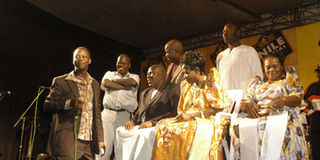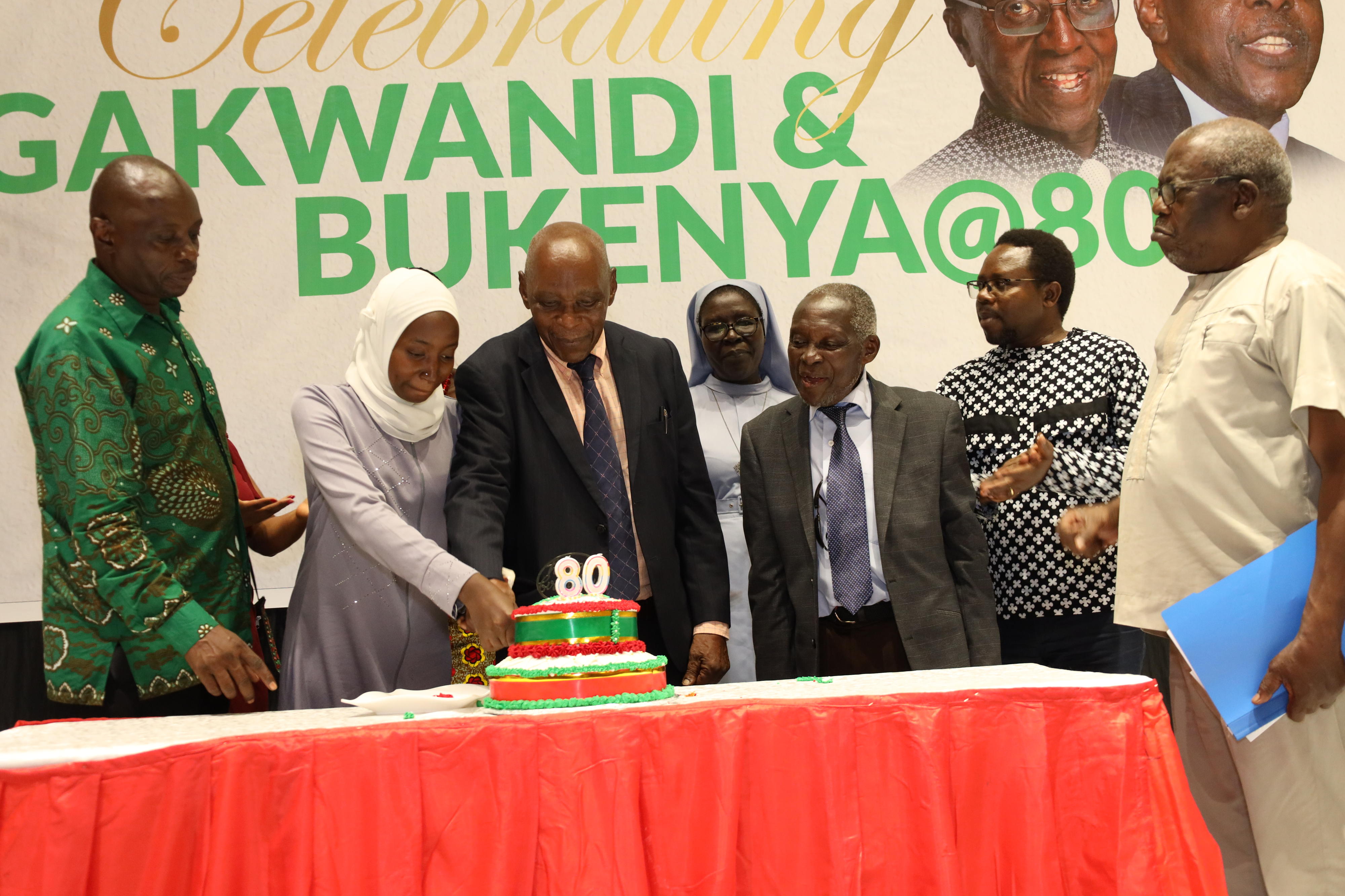25 years: The making of Mesach Semakula

Mesach Ssemakula kneels before his parents during one of his performances. PHOTO BY EDGAR R. BATTE
What you need to know:
Tested. His health once ailed but he got back on his feet. Mesach Ssemakula recently celebrated 25 years of music. EDGAR R. BATTE caught up with him for details about how he started out.
“Your Majesty, we will not try to defend ourselves. If the God whom we serve is able to save us from the blazing furnace and your power, then he will. But even if he doesn’t, Your Majesty, be sure that we will not worship your god, and we will not bow down to the gold statue that you have set up.”
Singer Mesach Semakula references the words of Biblical characters Shadrach, Meshach, and Abednego to tell his story. A story where his celebrity status exposed him to negative press which shook but did not break him.
As a boy, Semakula says he did not like the name, Mesach, thinking it was old fashioned, until his father implored him to read the Bible to understand its meaning. He was humbled.
Early start
His first trip to Kampala was in 1993 when Umaru Katumba, an artiste he admired called for a youngsters’ audition to recruit for Emitoes, a group he was establishing. Semakula, then 18, sneaked out of their home in Buwaate to join the contest.
“The judges were not only looking for good vocalists but also dancers and dramatists,” he says adding that it was how Grace Ssekamatte was selected but Semakula was not.
But he did well, going as far as the finals that attracted more than 1,000 contenders at Pride Theatre. He says the fact that he was still young made it easy for the judges to kick him out.
This competition is referred to in Bwagamba, his latest song, in the verse he sings that he was eliminated from a competition where Ssekamatte was the star and he was not.
That competition was judged by Paul Kato Lubwama, Andrew Benon Kibuuka, Charles James Ssenkubuge, Aloysius Matovu Joy, Livingstone Kasozi, Paulo Job Kafeero, Abby Mukiibi and Herman Basudde.
It was at the competition that he became close to Geoffrey Lutaaya and the two decided to further chase their music dream. Together, they formed Gebros, a group that later collapsed.
Semakula though had remained grounded and worked closely with artistes that had been there before them, it was not surprising that he and others easily ended up in Kato Lubwama’s Diamonds Production in 1996.

Mesach Semakula back in the day at a studio. FILE PHOTO
Enter the Eagles…
A year later, they were back to nothing when Diamonds Production sacked them abruptly. Then penniless, it is said that Lutaaya sold his omnibus to raise money for band equipment. However, this was not enough and they went off the scene for nearly a year.
When they made a comeback they were Eagles Production but stayed close to established groups.
It was only in 1999 that he released his debut album Ntomedde that was later bought by HK Music Recorders Sounds at Shs700,000, but that was only the beginning; his later releases, Silika Nkulojere and Sembera were bought at shs2.5m each and Wampangura at shs3m. In 2003, the band started making presence on the airwaves and among the songs that established it was Tukwegomba Bangi, Semakula’s breakthrough song that doubled as an album title.
The song enjoyed good airplay and Lusini Enterprises bought it at Shs13m. From the money, Semakula invested in starting Kann Records, a shop that sold tapes in the Old Taxi park.
Almost 25 years later, he has seen it all; a Pearl of Africa Music (Pam) Awards Male Artiste of the Year 2004 and Artiste of the Year in 2005, Semakula has also made his mark on the continent winning the Star of Africa in Cape Town, South Africa for his song Kulika Baby.
The other two recipients of the award are Kadongo Kamu stars, the late Paul Kafeero and Lord Fred Ssebatta.
Music and pirates
However, even when songs such as Ntongo, First Aid or Sigwe Onsimila were anthems, Semakula notes that today, releasing albums has stopped being lucrative since there are no suppliers.
“Pirates are many and have spoilt the music industry,” he says.
Musicians, he says, are now turning to making shows as opposed to selling albums; “As Golden Band, we hold shows every weekend we also need to slow down on that. We plan to get a home, like Afrigo Band, where our fans can see us perform.”
Away from the stage
Besides singing, Semakula is a farmer and businessman, operating a hangout, Papaz Spot, a recording studio and real estate. He is grateful to his music manager, Musa Kavuma, who has always pointed him in the right direction.
“He is my top gun. He is one person who will tell me something and I won’t talk back at him. When he told me he wanted me to get a respectable home, I was unceratin. At the time, I was staying in Kikajjo where I was beaten almost to death,” Semakula recounts.

Semakula and his children at home. FILE PHOTO
Instrumental manager
Kavuma told him to sell the home, along with his the Mitsubishi Pajero and drove him to see land in Buziga which had an old house.
“He told me to sign agreements. I had second thoughts but with time, after paying for the land, I got to appreciate that he meant well and had actually gotten me a prime spot in a good neighbourhood.”
Over the weekend, Semakula and Kavuma organised his latest concert Bwagamba that celebrated his achievements as well as giving him a platform to share his story with people that have been with him and supported him over the years.
What others say
Mesach has songs that have stood the test of time because he understands what people want. His music celebrates love and a range of subjects. He has sang about his love for Buganda and his king, among other relevant subjects. He is quite humble and down to earth. Success has never gotten to his head. He is a respectful person and has made music business. He is good at other businesses which has earned him more success.
Isaac Mulindwa, former organiser, Pam Awards
I met Mesach in 1997 at Diamonds Production. He had not become popular but his music was educative. He had released Ntomedde, a song which tackled HIV/Aids. When they left to form Eagles Production, I stayed with Diamonds. After I brought Lucky Dube and his show was successful they asked me to manage them. Mesach got his breakout songs which also promoted Eagles. He is respectful, obedient, seeks advice about music and beyond.
Musa Kavuma, manager
Mesach is my close friend and colleague in music for about 20 years. His integrity, leadership, unwavering commitment, patience and rare wisdom stand out. He is a trustworthy friend and one of my confidants. As a musician, he has been tested and he is one of our most experienced cadres. He has a great voice which he uses well. He chooses his topics and lyrics carefully. And he has ‘staying power’. My favourites are many but my all time is Abakazi abaguma and Jangu eno.
Sylver Kyagulanyi, friend
Quick take
• Music genre
Afropop
• Musical inspiration...
Life
• Happiest moment...
When Kabaka recognised and honoured me as Omusiime.
•Most challenging time of music career...
Blackmail from people out to tarnish my name.
•What you can’t do without...
God has been there for me. Then my family. It is part of me and are my purpose for working hard.
•Wish for Uganda...
A day when policy makers can share a table and make decisions for the good without fear or favour, irrespective of family ties, tribe and race.
•Favourite meal...
Matooke, beans, semutuundu (catfish), chapatti and sugarless dry tea.
•Favourite childhood memory...
Looking for and meeting my mother after 13 years. I never grew up with her and it was exciting.
•How often I go to church...
Every Sunday when I am not on work safari.
•Advice to budding artistes...
Think about what you want to be and research the subject you would like to sing about and the target audience. It is okay to be modern but not lose your traditions. You can big a star and remain humble. Seek respect not being feared.




